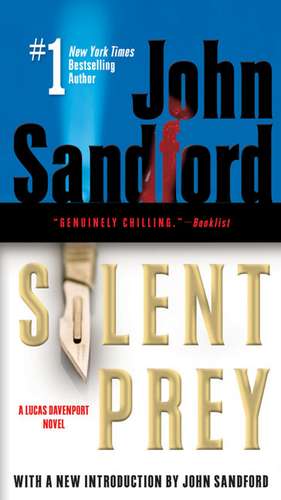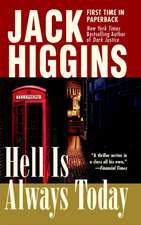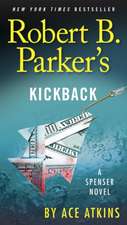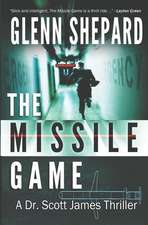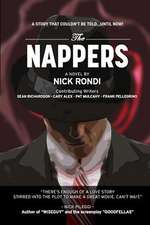Silent Prey: Lucas Davenport Mysteries
Autor John Sandforden Limba Engleză Paperback – 31 oct 2008 – vârsta de la 18 ani
Make noise for a new Prey package and new author introduction!
Dr. Mike Bekker, a psychotic pathologist, is back on the streets, doing what he does best?murdering one helpless victim after another. Lucas Davenport knows he should have killed Bekker when he had the chance. Now he has a second opportunity?and the time to hesitate is through.
Dr. Mike Bekker, a psychotic pathologist, is back on the streets, doing what he does best?murdering one helpless victim after another. Lucas Davenport knows he should have killed Bekker when he had the chance. Now he has a second opportunity?and the time to hesitate is through.
| Toate formatele și edițiile | Preț | Express |
|---|---|---|
| Paperback (2) | 59.76 lei 3-5 săpt. | |
| G.P. Putnam's Sons – 31 oct 2008 | 59.76 lei 3-5 săpt. | |
| Penguin Publishing Group – 5 dec 2023 | 75.92 lei 3-5 săpt. | +13.84 lei 4-10 zile |
Preț: 59.76 lei
Nou
Puncte Express: 90
Preț estimativ în valută:
11.44€ • 12.42$ • 9.61£
11.44€ • 12.42$ • 9.61£
Carte disponibilă
Livrare economică 01-15 aprilie
Preluare comenzi: 021 569.72.76
Specificații
ISBN-13: 9780425224465
ISBN-10: 0425224465
Pagini: 400
Dimensiuni: 107 x 185 x 30 mm
Greutate: 0.27 kg
Ediția:Berkley Premium.
Editura: G.P. Putnam's Sons
Seria Lucas Davenport Mysteries
ISBN-10: 0425224465
Pagini: 400
Dimensiuni: 107 x 185 x 30 mm
Greutate: 0.27 kg
Ediția:Berkley Premium.
Editura: G.P. Putnam's Sons
Seria Lucas Davenport Mysteries
Extras
1
A thought sparked in the chaos of Bekker’s mind. The jury.
He caught it, mentally, like a quick hand snatching a fly from midair.
Bekker slumped at the defense table, the center of the circus. His vacant blue eyes rolled back, pale and wide as a plastic baby- doll’s, wandering around the interior of the courtroom, snagging on a light fixture, catching on an electrical outlet, sliding past the staring faces. His hair had been cut jail house short, but they had let him keep the wild blond beard. An act of mercy: The beard disguised the tangled mass of pink scar tissue that crisscrossed his face. In the middle of the beard, his pink rosebud lips opened and closed, like an eel’s, damp and glistening.
Bekker looked at the thought he’d caught: The jury. House wives, retirees, welfare trash. His peers, they called them. A ridiculous concept: He was a doctor of medicine. He stood at the top of his profession. He was respected. Bekker shook his head.
Understand . . . ?
The word tumbled from the judge- crow’s mouth and echoed in his mind. “Do you understand, Mr. Bekker?”
What . . . ?
The idiot flat- faced attorney pulled at Bekker’s sleeve: “Stand up.”
What . . . ?
The prosecutor turned to stare at him, hate in her eyes. The hate touched him, reached him, and he opened his mind and let it flow back. I’d like to have you for five minutes, good sharp scalpel would open you up like a goddamn oyster: zip, zip. Like a goddamn clam.
The prosecutor felt Bekker’s interest. She was a hard woman; she’d put six hundred men and women behind bars. Their petty threats and silly pleas no longer interested her. But she flinched and turned away from Bekker.
What? Standing? Time now?
Bekker struggled back. It was so hard. He’d let himself go during the trial. He had no interest in it. Refused to testify. The outcome was fixed, and he had more serious problems to deal with. Like survival in the cages of the Hennepin County Jail, survival without his medicine.
But now the time had come.
His blood still moved too slowly, oozing through his arteries like strawberry jam. He fought, and simultaneously fought to hide his struggle.
Focus.
And he started, so slowly it was like walking through paste, trudging back to the courtroom. The trial had lasted for twenty- one days, had dominated the papers and the television newscasts. The cameras had ambushed him, morning
and night, hitting him in the face with their intolerable lights, the cameramen scuttling backward as they transferred him, in chains, between the jail and the courtroom. The courtroom was done in blond laminated wood, with the elevated judge’s bench at the head of the room, the jury box to the right, tables for the prosecution and defense in front of the judge. Behind the tables, a long rail divided the room in two. Forty uncomfortable spectator’s chairs were screwed to the floor behind the rail. The chairs were occupied an hour before arguments began, half of them allotted to the press, the other half given out on a first- come basis. All during the trial, he could hear his name passing through the ranks of spectators: Bekker Bekker Bekker.
The jury filed out. None of them looked at him. They’d be secluded, his peers, and after chatting for a decent interval, they’d come back and report him guilty of multiple counts of first- degree murder. The verdict was inevitable. When it was in, the crow would put him away.
The black asshole in the next cell had said it, in his phony street dialect: “They gon slam yo’ nasty ass into Oak Park, m’man. You live in a motherfuckin’ cage the size of a motherfuckin’ refrigerator wit a TV watching you every move. You wanta take a shit, they watchin’ every move, they makin’ movies of it. Nobody ever git outa Oak Park. It is a true motherfucker.”
But Bekker wasn’t going. The thought set him off again, and he shook, fought to control it.
Focus . . .
He focused on the small parts: the gym shorts biting into the flesh at his waist. The razor head pressed against the back of his balls. The Sox cap, obtained in a trade for cigarettes, tucked under his belt. His feet sweating in the ridiculous running shoes. Running shoes and white socks with his doctor’s pinstripes—he looked a fool and he knew it, hated it. Only a moron would wear white socks with pinstripes, but white socks and running shoes . . . no. People would be laughing at him.
He could have worn his wing tips, one last time—a man is innocent until proven guilty—but he refused. They didn’t understand that. They thought it was another eccentricity, the plastic shoes with the seven- hundred- dollar suit. They didn’t know.
Focus.
Everyone was standing now, the crow- suit staring, the attorney pulling at his sleeve. And here was Raymond Shaltie. . . .
“On your feet,” Shaltie said sharply, leaning over him. Shaltie was a sheriff’s deputy, an overweight time- server in an ill- fitting gray uniform.
“How long?” Bekker asked the attorney, looking up, struggling to get the words out, his tongue thick in his mouth.
“Shhh . . .”
The judge was talking, looking at them: “. . . standing by, and if you leave your numbers with my office, we’ll get in touch as soon as we get word from the jury . . .”
The attorney nodded, looking straight ahead. He wouldn’t meet Bekker’s eyes. Bekker had no chance. In his heart, the attorney didn’t want him to have a chance. Bekker was nuts. Bekker needed prison. Prison forever and several days more.
“How long?” Bekker asked again. The judge had disappeared into her chambers. Like to get her, too.
“Can’t tell. They’ll have to consider the separate counts,” the attorney said. He was court- appointed, needed the money. “We’ll come get you. . . .”
Pig’s eye, they would.
“Let’s go,” said Shaltie. He took Bekker’s elbow, dug his fingertips into the nexus of nerves above Bekker’s elbow, an old jailer’s trick to establish dominance. Unknowingly, Shaltie did Bekker a favor. With the sudden sharp pulse of pain, Bekker snapped all the way back, quick and hard, like a handclap.
His eyes flicked once around the room, his mind cold, its usual chaos squeezed into a high- pressure corner, wild thoughts raging like rats in a cage. Calculating. He put pain in his voice, a childlike plea: “I need to go. . . .”
“Okay.” Shaltie nodded. Ray Shaltie wasn’t a bad man. He’d worked the courts for two de cades, and the experience had mellowed him—allowed him to see the human side of even the worst of men. And Bekker was the worst of men.
But Bekker was nevertheless human, Shaltie believed: He that is without sin among you, let him cast the first stone. . . . Bekker was a man gone wrong, but still a man. And in words that bubbled from his mouth in a whiny singsong, Bekker told Shaltie about his hemorrhoids. Jail food was bad for them, Bekker said. All cheese and bread and pasta. Not enough roughage. He had to go. . . .
He always used the bathroom at noon, all through the twenty- one days of the trial. Raymond Shaltie sympathized: He’d had them himself. Shaltie took Bekker by the arm and led him past the now empty jury box, Bekker shuffling, childlike, eyes unfocused. At the door, Shaltie turned him— docile, quiet, apparently gone to another world—and put on the handcuffs and then the leg chains. Another deputy watched the pro cess, and when Bekker was locked up, drifted away, thinking of lunch.
“Gotta go,” Bekker said. His eyes turned up to Ray Shaltie.
“You’ll be okay, you’ll be okay,” Shaltie said. Shaltie’s tie had soup stains on it, and flakes of dandruff spotted his shoulders: an oaf, Bekker thought. Shaltie led Bekker out of the courtroom, Bekker doing the jail house shuffle, his legs restricted to a thirty- inch stride. Behind the courtroom, a narrow hallway led to an internal stairway, and from there, to a holding cell. But to the left, through a service door, was a tiny employees- only men’s room, with a sink, a urinal, a single stall.
Shaltie followed Bekker into the men’s room. “Now, you’re okay . . .” A warning in his voice. Ray Shaltie was too old to fight.
“Yes,” Bekker said, his pale- blue eyes wandering in their sockets. Behind the wandering eyes, his mind was moving easily now, the adrenaline acting on his brain like a dose of the purest amphetamine. He turned, lifted his arms up and back, thrusting his wrists at Shaltie. Shaltie fitted the key, uncuffed the prisoner: Shaltie was breaking the rules, but a man can’t wipe himself if he’s wearing handcuffs. Besides, where would Bekker go, high up here in the government building, with the leg chains? He couldn’t run. And his wildly bearded face was, for the moment at least, the most recognizable face in the Cities.
Bekker shuffled into the stall, shut the door, dropped his trousers, sat down. Eyes sharp now, focused. They used disposable safety razors in the jail, Bics. He’d broken the handle off one, leaving only the head and a stub, easy to hide during the shakedowns. When he’d had a chance, he’d burned the stub with a match, rounding the edges, to make it more comfortable to wear. This morning he’d taped it under his balls, fixed with the end of a Band- Aid. Now he peeled the razor off himself, pulled the remaining tape off the razor, and began hacking at his beard.
He’d grown the beard to cover his furrowed face. Bekker, once so beautiful, the possessor of a classic Nordic face, a pale, uninflected oval with rose lips, had been beaten into a grotesque gnome, torn to pieces and only poorly repaired. Davenport. Get Davenport. The fantasy seized him: opening Davenport, using the knife to peel the face, lifting the skin off inch by inch. . . .
He fought it: Fantasies were for the lockup. He forced Davenport out of his mind and continued shaving, quickly, raggedly, the razor scraping over his dry skin. The pain prompted a groan. Outside the stall, Shaltie winced.
“ ’Bout done in there?” Shaltie called. The bathroom smelled of ammonia, chlorine, urine, and wet mops.
“Yes, Ray.” Bekker dropped the razor in his jacket pocket, then worked on the toilet- paper holder. Originally, it had been held in place with four screws. He’d removed and flushed two of them during the first three days of the trial, and had worked the other two loose. He’d actually had them out the day before, to make sure the holder would pull free. It had. Now he removed the screws one last time, dropped them in the toilet and eased the paper- holder free from the wall. When he grasped it by the roller, it fit his hand like a steel boxing glove.
“Okay now, Ray.” Bekker stood, pulled his pants up, pulled off his jacket, dropped the coat over the iron fist, flushed the toilet. Took a breath. Put his head down, as though he were looking at his fly. Opened the door. Shuffled forward.
Shaltie was waiting with the cuffs: jowly, freckled, slow on the uptake. “Turn around. . . .”
Seeing Bekker’s face, realizing: “Hey . . .”
Bekker was half- turned, wound up. He dropped the jacket, his right hand whipping like a lash, his mouth open, his white teeth flashing in the fluorescence. Shaltie lurched back, tried to cover with a hand. Too late, too late. The stainless- steel club hit him above the ear: Shaltie went down, cracking the back of his head on the porcelain sink as he fell.
And then Bekker was on him, lifting the steel fist, smashing it down, lifting it, feeling Shaltie’s skull crack, the blood spatter.
Hit hit hit hit . . .
The synapses of Bekker’s brain lit with the static sparks. He fought it, fought for control, but it was hard, the smell of fresh blood in his nose. He stopped swinging, found his left hand on Shaltie’s throat. Pulled the hand away, half stood, brain not quite right. He said aloud, shushing himself, “Shhh. Shhhhhh,” finger to his lips.
He straightened. His blood was running like water now, like steam, filling him. Now what? Door. He hobbled to the door, flipped the catch. Locked. Good. He went back to Shaltie, who was supine on the tile floor, blowing blood bubbles through his torn nose. Bekker had watched the deputy handle his keys, and the keys had gone in Shaltie’s right pocket. . . . He found them, popped the locks on the leg chains. Free. Free.
Stop. He brought himself back, looked in the mirror. His face was a mess. He retrieved the razor from his jacket pocket, splashed water and liquid soap on his face and raked the razor across it. Listened to Shaltie, breathing, a gargling moan. Shaltie’s head lay in a puddle of blood, and Bekker could smell it.
Bekker threw the razor in a trash basket, turned, stooped, caught Shaltie under the shoulders, dragged him to the toilet stall, sat him on the toilet and propped him against the wall. Shaltie made a snoring sound and more blood bubbled from his nose. Bekker ignored him. Not much time.
He stripped off his suit pants, put the Sox hat on his head, and used the pants to wipe up the blood on the floor. When he finished, he threw the pants, jacket, shirt and tie over Shaltie’s body. Checked himself in the mirror: green tank top, red shorts, gym shoes, hat. A jogger. The face was bad, but nobody had seen him close up, without a beard, for weeks. A few of the cops would know him, a couple of lawyers. But with any luck, they wouldn’t be looking at joggers.
Davenport. The thought stopped him. If Davenport was out there, had come to see the verdict, Bekker was a dead man.
No help for that. He threw off the thought, took a breath. Ready. He stepped inside the stall with Shaltie, locked it, dropped to his back, slid under the door, stood up again.
“Motherfucker.” He said it out loud, had learned it in jail: the standard, all- purpose curse. He dropped back on the floor, slid halfway under the stall, groped for Shaltie’s wallet. Found it, checked it. Twelve dollars. One credit card, a Visa. Not good. Money could be a problem. . . . He slipped the wallet into his underpants, went to the door, listened.
Could hear Shaltie breathing, bubbling. Bekker thought about going back into the stall, strangling him with his belt. All the humiliations of the past weeks, the torture when they took away his chemicals . . . Not enough time. Time was hurting him now. Had to move.
He left Shaltie living, turned the lock knob, peered into the hallway. The internal corridor was empty. Went to the next door—public hall. Half dozen people, all down at the public end, near the elevators, talking. He wouldn’t have to walk past them. The stairs were the other way: He could see the exit sign, just beyond the fire hose.
Another breath. And move. He stepped out into the hall, head down. A lunchtime bureaucrat- jogger on his way outside. He walked confidently down the hall to the stairs, away from the elevators. Waiting for a shout. For someone to point a finger. For running feet.
He was in the stairway. Nobody took the stairs, not from this high up. . . .
He ran down, counting the floors. As he passed six, a door slammed somewhere below and he heard somebody walking down ahead of him. He padded softly behind, heard another door open and shut, and stepped up the pace again. At the main level, he stopped and looked out. Dozens of people milled through the reception area. Okay. This was the second floor. He needed one more. He went down another level, and found an unmarked steel door. He pushed it open. He was outside, standing on the plaza. The summer sun was brilliant, the breeze smelled of popcorn and pigeons. A woman sitting on a bench, a kid next to her. She was cutting an apple with a penknife, her kid waiting for the apple.
Head down, Bekker jogged past her. Just another lunchtime fitness freak, weaving through the traffic, knees up, sweating in the sunshine.
Running like a maniac.
A thought sparked in the chaos of Bekker’s mind. The jury.
He caught it, mentally, like a quick hand snatching a fly from midair.
Bekker slumped at the defense table, the center of the circus. His vacant blue eyes rolled back, pale and wide as a plastic baby- doll’s, wandering around the interior of the courtroom, snagging on a light fixture, catching on an electrical outlet, sliding past the staring faces. His hair had been cut jail house short, but they had let him keep the wild blond beard. An act of mercy: The beard disguised the tangled mass of pink scar tissue that crisscrossed his face. In the middle of the beard, his pink rosebud lips opened and closed, like an eel’s, damp and glistening.
Bekker looked at the thought he’d caught: The jury. House wives, retirees, welfare trash. His peers, they called them. A ridiculous concept: He was a doctor of medicine. He stood at the top of his profession. He was respected. Bekker shook his head.
Understand . . . ?
The word tumbled from the judge- crow’s mouth and echoed in his mind. “Do you understand, Mr. Bekker?”
What . . . ?
The idiot flat- faced attorney pulled at Bekker’s sleeve: “Stand up.”
What . . . ?
The prosecutor turned to stare at him, hate in her eyes. The hate touched him, reached him, and he opened his mind and let it flow back. I’d like to have you for five minutes, good sharp scalpel would open you up like a goddamn oyster: zip, zip. Like a goddamn clam.
The prosecutor felt Bekker’s interest. She was a hard woman; she’d put six hundred men and women behind bars. Their petty threats and silly pleas no longer interested her. But she flinched and turned away from Bekker.
What? Standing? Time now?
Bekker struggled back. It was so hard. He’d let himself go during the trial. He had no interest in it. Refused to testify. The outcome was fixed, and he had more serious problems to deal with. Like survival in the cages of the Hennepin County Jail, survival without his medicine.
But now the time had come.
His blood still moved too slowly, oozing through his arteries like strawberry jam. He fought, and simultaneously fought to hide his struggle.
Focus.
And he started, so slowly it was like walking through paste, trudging back to the courtroom. The trial had lasted for twenty- one days, had dominated the papers and the television newscasts. The cameras had ambushed him, morning
and night, hitting him in the face with their intolerable lights, the cameramen scuttling backward as they transferred him, in chains, between the jail and the courtroom. The courtroom was done in blond laminated wood, with the elevated judge’s bench at the head of the room, the jury box to the right, tables for the prosecution and defense in front of the judge. Behind the tables, a long rail divided the room in two. Forty uncomfortable spectator’s chairs were screwed to the floor behind the rail. The chairs were occupied an hour before arguments began, half of them allotted to the press, the other half given out on a first- come basis. All during the trial, he could hear his name passing through the ranks of spectators: Bekker Bekker Bekker.
The jury filed out. None of them looked at him. They’d be secluded, his peers, and after chatting for a decent interval, they’d come back and report him guilty of multiple counts of first- degree murder. The verdict was inevitable. When it was in, the crow would put him away.
The black asshole in the next cell had said it, in his phony street dialect: “They gon slam yo’ nasty ass into Oak Park, m’man. You live in a motherfuckin’ cage the size of a motherfuckin’ refrigerator wit a TV watching you every move. You wanta take a shit, they watchin’ every move, they makin’ movies of it. Nobody ever git outa Oak Park. It is a true motherfucker.”
But Bekker wasn’t going. The thought set him off again, and he shook, fought to control it.
Focus . . .
He focused on the small parts: the gym shorts biting into the flesh at his waist. The razor head pressed against the back of his balls. The Sox cap, obtained in a trade for cigarettes, tucked under his belt. His feet sweating in the ridiculous running shoes. Running shoes and white socks with his doctor’s pinstripes—he looked a fool and he knew it, hated it. Only a moron would wear white socks with pinstripes, but white socks and running shoes . . . no. People would be laughing at him.
He could have worn his wing tips, one last time—a man is innocent until proven guilty—but he refused. They didn’t understand that. They thought it was another eccentricity, the plastic shoes with the seven- hundred- dollar suit. They didn’t know.
Focus.
Everyone was standing now, the crow- suit staring, the attorney pulling at his sleeve. And here was Raymond Shaltie. . . .
“On your feet,” Shaltie said sharply, leaning over him. Shaltie was a sheriff’s deputy, an overweight time- server in an ill- fitting gray uniform.
“How long?” Bekker asked the attorney, looking up, struggling to get the words out, his tongue thick in his mouth.
“Shhh . . .”
The judge was talking, looking at them: “. . . standing by, and if you leave your numbers with my office, we’ll get in touch as soon as we get word from the jury . . .”
The attorney nodded, looking straight ahead. He wouldn’t meet Bekker’s eyes. Bekker had no chance. In his heart, the attorney didn’t want him to have a chance. Bekker was nuts. Bekker needed prison. Prison forever and several days more.
“How long?” Bekker asked again. The judge had disappeared into her chambers. Like to get her, too.
“Can’t tell. They’ll have to consider the separate counts,” the attorney said. He was court- appointed, needed the money. “We’ll come get you. . . .”
Pig’s eye, they would.
“Let’s go,” said Shaltie. He took Bekker’s elbow, dug his fingertips into the nexus of nerves above Bekker’s elbow, an old jailer’s trick to establish dominance. Unknowingly, Shaltie did Bekker a favor. With the sudden sharp pulse of pain, Bekker snapped all the way back, quick and hard, like a handclap.
His eyes flicked once around the room, his mind cold, its usual chaos squeezed into a high- pressure corner, wild thoughts raging like rats in a cage. Calculating. He put pain in his voice, a childlike plea: “I need to go. . . .”
“Okay.” Shaltie nodded. Ray Shaltie wasn’t a bad man. He’d worked the courts for two de cades, and the experience had mellowed him—allowed him to see the human side of even the worst of men. And Bekker was the worst of men.
But Bekker was nevertheless human, Shaltie believed: He that is without sin among you, let him cast the first stone. . . . Bekker was a man gone wrong, but still a man. And in words that bubbled from his mouth in a whiny singsong, Bekker told Shaltie about his hemorrhoids. Jail food was bad for them, Bekker said. All cheese and bread and pasta. Not enough roughage. He had to go. . . .
He always used the bathroom at noon, all through the twenty- one days of the trial. Raymond Shaltie sympathized: He’d had them himself. Shaltie took Bekker by the arm and led him past the now empty jury box, Bekker shuffling, childlike, eyes unfocused. At the door, Shaltie turned him— docile, quiet, apparently gone to another world—and put on the handcuffs and then the leg chains. Another deputy watched the pro cess, and when Bekker was locked up, drifted away, thinking of lunch.
“Gotta go,” Bekker said. His eyes turned up to Ray Shaltie.
“You’ll be okay, you’ll be okay,” Shaltie said. Shaltie’s tie had soup stains on it, and flakes of dandruff spotted his shoulders: an oaf, Bekker thought. Shaltie led Bekker out of the courtroom, Bekker doing the jail house shuffle, his legs restricted to a thirty- inch stride. Behind the courtroom, a narrow hallway led to an internal stairway, and from there, to a holding cell. But to the left, through a service door, was a tiny employees- only men’s room, with a sink, a urinal, a single stall.
Shaltie followed Bekker into the men’s room. “Now, you’re okay . . .” A warning in his voice. Ray Shaltie was too old to fight.
“Yes,” Bekker said, his pale- blue eyes wandering in their sockets. Behind the wandering eyes, his mind was moving easily now, the adrenaline acting on his brain like a dose of the purest amphetamine. He turned, lifted his arms up and back, thrusting his wrists at Shaltie. Shaltie fitted the key, uncuffed the prisoner: Shaltie was breaking the rules, but a man can’t wipe himself if he’s wearing handcuffs. Besides, where would Bekker go, high up here in the government building, with the leg chains? He couldn’t run. And his wildly bearded face was, for the moment at least, the most recognizable face in the Cities.
Bekker shuffled into the stall, shut the door, dropped his trousers, sat down. Eyes sharp now, focused. They used disposable safety razors in the jail, Bics. He’d broken the handle off one, leaving only the head and a stub, easy to hide during the shakedowns. When he’d had a chance, he’d burned the stub with a match, rounding the edges, to make it more comfortable to wear. This morning he’d taped it under his balls, fixed with the end of a Band- Aid. Now he peeled the razor off himself, pulled the remaining tape off the razor, and began hacking at his beard.
He’d grown the beard to cover his furrowed face. Bekker, once so beautiful, the possessor of a classic Nordic face, a pale, uninflected oval with rose lips, had been beaten into a grotesque gnome, torn to pieces and only poorly repaired. Davenport. Get Davenport. The fantasy seized him: opening Davenport, using the knife to peel the face, lifting the skin off inch by inch. . . .
He fought it: Fantasies were for the lockup. He forced Davenport out of his mind and continued shaving, quickly, raggedly, the razor scraping over his dry skin. The pain prompted a groan. Outside the stall, Shaltie winced.
“ ’Bout done in there?” Shaltie called. The bathroom smelled of ammonia, chlorine, urine, and wet mops.
“Yes, Ray.” Bekker dropped the razor in his jacket pocket, then worked on the toilet- paper holder. Originally, it had been held in place with four screws. He’d removed and flushed two of them during the first three days of the trial, and had worked the other two loose. He’d actually had them out the day before, to make sure the holder would pull free. It had. Now he removed the screws one last time, dropped them in the toilet and eased the paper- holder free from the wall. When he grasped it by the roller, it fit his hand like a steel boxing glove.
“Okay now, Ray.” Bekker stood, pulled his pants up, pulled off his jacket, dropped the coat over the iron fist, flushed the toilet. Took a breath. Put his head down, as though he were looking at his fly. Opened the door. Shuffled forward.
Shaltie was waiting with the cuffs: jowly, freckled, slow on the uptake. “Turn around. . . .”
Seeing Bekker’s face, realizing: “Hey . . .”
Bekker was half- turned, wound up. He dropped the jacket, his right hand whipping like a lash, his mouth open, his white teeth flashing in the fluorescence. Shaltie lurched back, tried to cover with a hand. Too late, too late. The stainless- steel club hit him above the ear: Shaltie went down, cracking the back of his head on the porcelain sink as he fell.
And then Bekker was on him, lifting the steel fist, smashing it down, lifting it, feeling Shaltie’s skull crack, the blood spatter.
Hit hit hit hit . . .
The synapses of Bekker’s brain lit with the static sparks. He fought it, fought for control, but it was hard, the smell of fresh blood in his nose. He stopped swinging, found his left hand on Shaltie’s throat. Pulled the hand away, half stood, brain not quite right. He said aloud, shushing himself, “Shhh. Shhhhhh,” finger to his lips.
He straightened. His blood was running like water now, like steam, filling him. Now what? Door. He hobbled to the door, flipped the catch. Locked. Good. He went back to Shaltie, who was supine on the tile floor, blowing blood bubbles through his torn nose. Bekker had watched the deputy handle his keys, and the keys had gone in Shaltie’s right pocket. . . . He found them, popped the locks on the leg chains. Free. Free.
Stop. He brought himself back, looked in the mirror. His face was a mess. He retrieved the razor from his jacket pocket, splashed water and liquid soap on his face and raked the razor across it. Listened to Shaltie, breathing, a gargling moan. Shaltie’s head lay in a puddle of blood, and Bekker could smell it.
Bekker threw the razor in a trash basket, turned, stooped, caught Shaltie under the shoulders, dragged him to the toilet stall, sat him on the toilet and propped him against the wall. Shaltie made a snoring sound and more blood bubbled from his nose. Bekker ignored him. Not much time.
He stripped off his suit pants, put the Sox hat on his head, and used the pants to wipe up the blood on the floor. When he finished, he threw the pants, jacket, shirt and tie over Shaltie’s body. Checked himself in the mirror: green tank top, red shorts, gym shoes, hat. A jogger. The face was bad, but nobody had seen him close up, without a beard, for weeks. A few of the cops would know him, a couple of lawyers. But with any luck, they wouldn’t be looking at joggers.
Davenport. The thought stopped him. If Davenport was out there, had come to see the verdict, Bekker was a dead man.
No help for that. He threw off the thought, took a breath. Ready. He stepped inside the stall with Shaltie, locked it, dropped to his back, slid under the door, stood up again.
“Motherfucker.” He said it out loud, had learned it in jail: the standard, all- purpose curse. He dropped back on the floor, slid halfway under the stall, groped for Shaltie’s wallet. Found it, checked it. Twelve dollars. One credit card, a Visa. Not good. Money could be a problem. . . . He slipped the wallet into his underpants, went to the door, listened.
Could hear Shaltie breathing, bubbling. Bekker thought about going back into the stall, strangling him with his belt. All the humiliations of the past weeks, the torture when they took away his chemicals . . . Not enough time. Time was hurting him now. Had to move.
He left Shaltie living, turned the lock knob, peered into the hallway. The internal corridor was empty. Went to the next door—public hall. Half dozen people, all down at the public end, near the elevators, talking. He wouldn’t have to walk past them. The stairs were the other way: He could see the exit sign, just beyond the fire hose.
Another breath. And move. He stepped out into the hall, head down. A lunchtime bureaucrat- jogger on his way outside. He walked confidently down the hall to the stairs, away from the elevators. Waiting for a shout. For someone to point a finger. For running feet.
He was in the stairway. Nobody took the stairs, not from this high up. . . .
He ran down, counting the floors. As he passed six, a door slammed somewhere below and he heard somebody walking down ahead of him. He padded softly behind, heard another door open and shut, and stepped up the pace again. At the main level, he stopped and looked out. Dozens of people milled through the reception area. Okay. This was the second floor. He needed one more. He went down another level, and found an unmarked steel door. He pushed it open. He was outside, standing on the plaza. The summer sun was brilliant, the breeze smelled of popcorn and pigeons. A woman sitting on a bench, a kid next to her. She was cutting an apple with a penknife, her kid waiting for the apple.
Head down, Bekker jogged past her. Just another lunchtime fitness freak, weaving through the traffic, knees up, sweating in the sunshine.
Running like a maniac.
Descriere
Now repackaged in a tall Premium Edition, this classic Prey novel finds psychotic pathologist Mike Bekker back on the streets, doing what he does best--murdering helpless victims. Lucas Davenport knows he should have killed Bekker when he had the chance. Now he has a second opportunity. Reissue.
